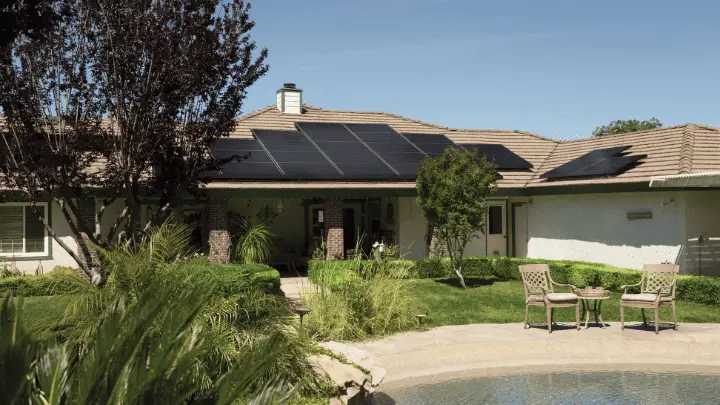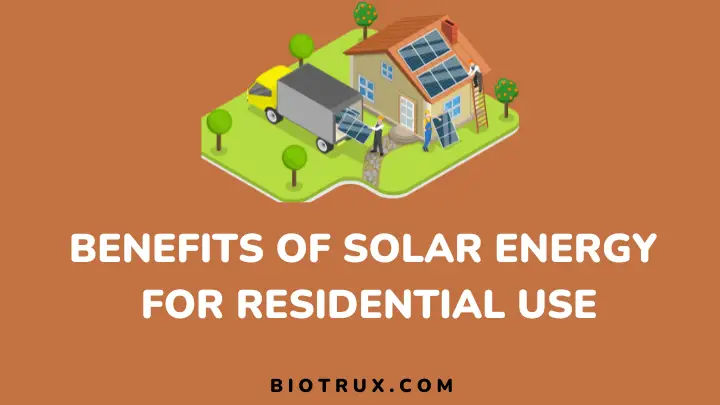Are you exhausted from paying exorbitant energy expenses every month? Are you looking for a green and sustainable way to power your home? If so, you’ve come to the correct place. In this article, we’ll go over the benefits of solar energy for residential use and how you may make the move.
Solar energy is becoming more popular for homeowners looking to save energy expenses, lessen their carbon impact, and boost their energy independence. Utilizing solar energy can help you produce electricity, become less reliant on other energy sources, and save money on utility bills.
In this article, you’ll find the benefits of using solar energy. I’ll also discuss net metering, which allows you to sell extra electricity back to the power system. Continue reading to learn more about how solar energy might help you and your house.
1. Lower Energy Bills
If you opt for solar energy for residential use, you can significantly reduce your monthly energy bills. Solar panels generate electricity and make you less reliant on traditional power sources, leading to substantial cost savings over time.
You can reduce your dependence on utility companies and their fluctuating energy prices by producing electricity, providing long-term financial benefits.
Moreover, solar panels can produce more energy than you need, allowing you to sell the excess energy back to the grid, earning you a credit on your utility bill.
2. Environmental Benefits
One of the most significant benefits of solar energy for residential use is its positive environmental impact. Harnessing solar power at home is a green energy source, producing no emissions and helping combat climate change.
Unlike traditional power sources, solar energy does not emit harmful pollutants into the atmosphere, making it a more sustainable and eco-friendly option. By switching to solar energy, homeowners can reduce their carbon footprint and contribute to a healthier planet.
Overall, the environmental benefits of solar energy make it an excellent choice for homeowners looking to reduce their carbon footprint and live a more sustainable lifestyle.
3. Energy Independence
This means you can generate electricity from the sun without relying on the grid or utility companies. Installing solar panels on your roof can reduce your dependence on fossil fuels and lower your carbon footprint.
You can also save money on energy bills and protect yourself from rising electricity prices. You are less affected by power outages and energy price fluctuations, providing stability and peace of mind. It also gives you more control over your energy consumption and production.
Energy independence is not only good for your wallet but also for the environment and the future of our planet.
4. Increased Property Value
One of the benefits of solar energy for residential use is that it can increase the value of your property. According to Zillow Research, homes with solar panels sell for about 4% more than similar homes without them.
Investing in solar energy can save you money on your electricity bills and make you money when you decide to sell your home.
Solar panels can also make your home more attractive to potential buyers, especially those who are environmentally conscious or looking for energy independence. By installing solar panels, you can show that you care about the environment and reduce your carbon footprint.
5. Federal and State Incentives
One of the benefits of solar energy for residential use is that you can save money on your electricity bills and reduce your carbon footprint. But did you know that you can also get paid for going solar?
That’s right, there are federal and state incentives that reward homeowners who install solar panels on their roofs. The federal solar tax credit allows you to deduct 26% of the cost of your solar system from your federal income taxes.
If you spend $10,000 on a solar system, you can save $2,600 on your taxes. The discount is available until 2023 but will decrease to 22% in 2023 and expire in 2024. So, take advantage of this opportunity to claim it.
Depending on where you live, you may also qualify for state and local incentives, such as rebates, grants, loans, or net metering.
6. Net Metering
Net metering is a policy that allows you to sell the excess electricity that your solar panels produce back to the grid at a fixed rate. This way, you can offset your electricity costs even more and earn extra income.
You can use the Database of State Incentives for Renewables and Efficiency (DSIRE) to find out what incentives are available in your area. It is a comprehensive online resource that lists all the policies and programs that support renewable energy in the U.S.
You can also contact a local solar installer who can help you navigate the process and maximize your savings. Going solar is not only good for the environment but also for your wallet.
Net metering can make your solar investment more affordable and profitable. Take your time and start enjoying the benefits of solar energy for residential use today.
7. Low Maintenance
Solar panels are a low-maintenance investment. They require only occasional checks and regular cleaning to keep them running efficiently. Unlike traditional power sources, solar panels have no moving parts, so there’s less wear and tear and less need for repairs.
In fact, most solar panels come with a warranty of 25 years or more, and they can last even longer with proper maintenance. With solar energy, you can enjoy long-term savings and peace of mind, knowing that your investment is durable and reliable.
8. Long-Term Investment
Solar energy’s long-term investment is one of the most significant benefits for residential use. By installing solar panels on your roof, you can significantly reduce your monthly energy bills and eventually recoup the cost of your investment.
While the initial cost of installing solar panels may seem daunting, it is a wise investment that pays off over time. With solar energy, you can avoid the rising costs of traditional electricity sources and protect yourself from energy price fluctuations.
Overall, investing in solar energy for residential use is a smart decision that provides long-term financial benefits and helps you live a more sustainable lifestyle.

Making the Switch to Solar
So, how can you transition your home to solar energy? It’s a straightforward process, and the benefits are well worth it. Here’s a step-by-step guide:
1. Assessment
Before transitioning your home to solar energy, assessing your energy needs and the available space for solar panels is important. This will help determine the size and type of solar panel system best suits your energy requirements.
Assessing the available space for solar panels involves identifying the areas on your property that receive the most sunlight and are free from obstructions.
This will help you determine the optimal placement of the solar panels. It’ll also help to determine the number of panels needed to generate enough electricity to meet your energy demands.
2. Choosing a solar company
It’s crucial to do thorough research and choose a reputable solar installation company with a proven track record of successful installations. To ensure the installation’s quality, ensure the company you select is licensed and experienced.
It must also have a team of skilled professionals to carry out the installation process. Choosing a reliable company will help avoid potential issues arising during or after installation. Your chosen company will handle the necessary permits and paperwork.
3. Financing options
When considering financing for solar panel installation, exploring all available options, including leases, loans, or cash purchases, is important. Leasing solar panels is a popular option for homeowners who want to go solar without a large upfront investment.
With a lease, you pay a fixed monthly fee for using the solar panels, and the leasing company typically handles maintenance and repairs. Alternatively, you can opt for a loan to finance the installation, which can help you avoid paying high interest rates associated with other types of loans.
Cash purchases are another option, and they provide the most significant long-term savings. Whatever financing option you choose, carefully consider the terms and conditions.
4. Installation and connection
The installation process involves several steps and can take anywhere from one to several days, depending on the size and complexity of the system. The process begins with installing the solar panels on your roof or in another location on your property that receives ample sunlight.
The panels are then connected to an inverter, which converts the DC power generated by the panels into AC power that can be used in your home. The inverter is then connected to your home’s electrical system, allowing you to power your home with solar energy.
Once the installation is complete, a qualified technician will conduct a thorough inspection to ensure the system works correctly and meets all safety and code requirements.
Overall, the installation process is straightforward, and a reputable solar installer or company will ensure that the installation is carried out efficiently and to the highest standards.
5. Monitoring
Most modern solar panel systems have advanced monitoring tools that allow you to keep track of your energy production in real-time. These tools provide detailed information about the amount of electricity your solar panels generate and the amount of energy your home consumes.
With this information, you can monitor your energy usage and identify areas to optimize your energy consumption further. Additionally, these monitoring tools can help you identify any potential issues with your system.
This can include a decrease in energy production or a malfunctioning panel, allowing you to address the problem quickly and efficiently. Overall, these monitoring tools provide valuable insights into your energy consumption and help you make informed decisions about your energy usage.
FAQs
Is solar energy a reliable source for residential use?
Yes. Solar energy is highly reliable. Modern systems are designed to work efficiently, even on cloudy days.
What is the lifespan of solar panels?
Most solar panels have a lifespan of 25 to 30 years, with warranties covering at least 20 years.
Are there any tax incentives for installing solar panels?
Yes. Many governments offer tax incentives and rebates to encourage the use of solar energy, making it a more affordable option for homeowners.
Can you still use electricity from the grid with solar panels?
Yes. One of the advantages of solar panels is that they can be used in conjunction with grid electricity. This means homeowners can use grid electricity when their solar panels don’t generate enough power, such as at night.
Do solar panels require a lot of maintenance?
No. Solar panels are also low maintenance; regular cleaning and occasional checks are usually sufficient.
Summary
In the ever-evolving quest for a brighter, cleaner, and more sustainable future, the benefits of solar energy for residential use shine as a beacon of hope. As I draw the curtains on this enlightening journey, please remember that embracing solar power is not just about saving on your energy bills.
It’s about making a powerful statement in favor of our planet. The sun, our eternal source of light and life, offers us a remarkable opportunity to be environmentally responsible and financially savvy. So, take that first step towards energy independence, lower bills, and a greener world.
Your home can be a solar-powered sanctuary, and the possibilities are endless. To dive deeper into the boundless benefits of solar energy for residential use, learn more about what happens when solar panels get old. You can also find out how long solar batteries last.
Thanks for reading.

